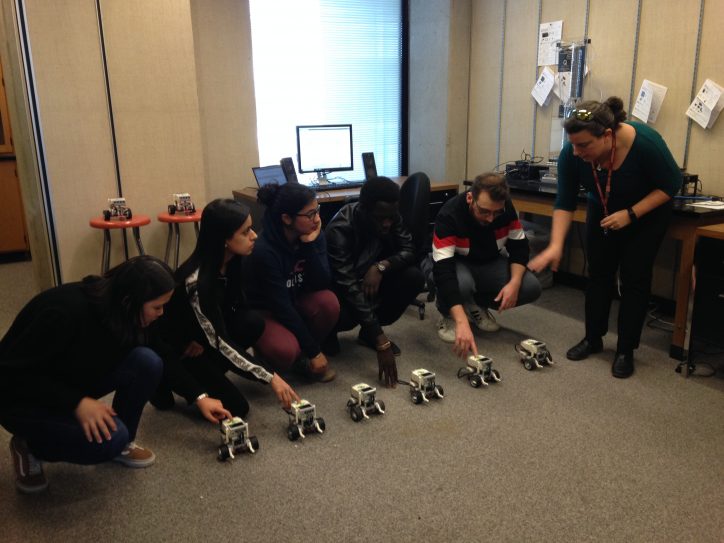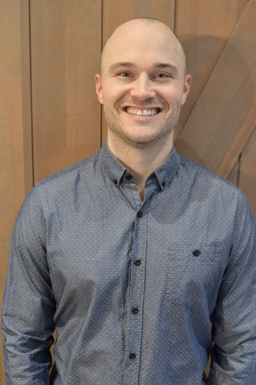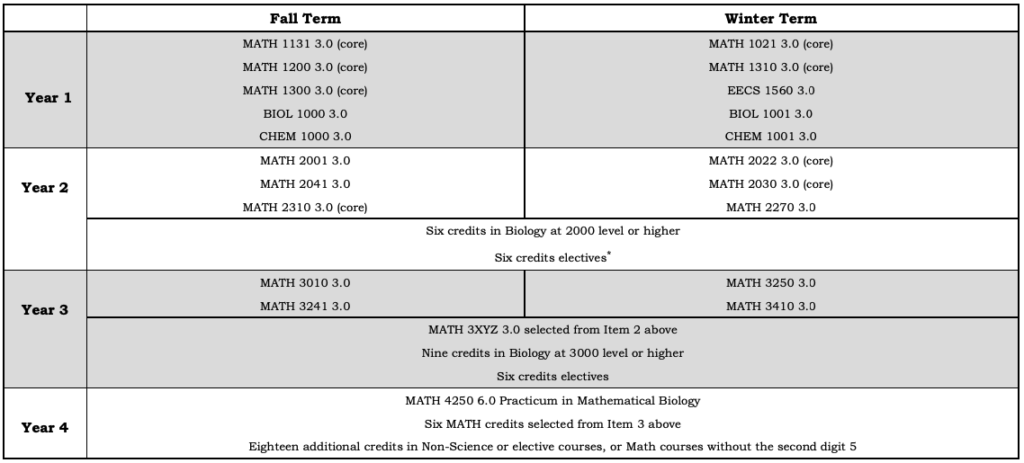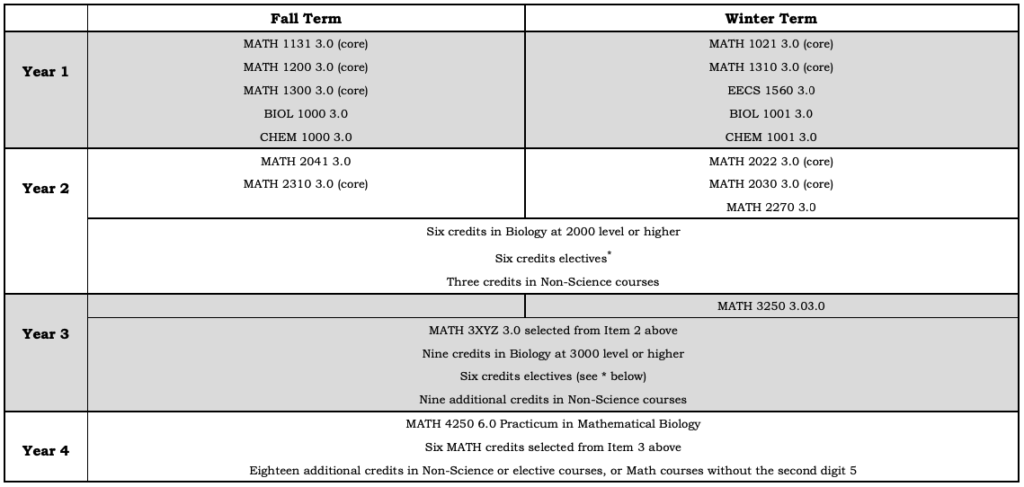At York University, we are proud to train the next generation of scientists. Our Mathematical Biology program is the only undergraduate degree in mathematical biology across Canada. We provide practical training, tools, and knowledge for the next generation of individuals to be experts in the theoretical approach and analysis of mathematical and statistical sciences to Biology.
Outlook: The Mathematical Biology program trains the next generation of experts in the quantitative and qualitative analysis of biological systems. The program has a strong foundation in mathematical modelling, computer programming, laboratory training in biology, kinesiology, experimental methods, and data analysis. The program enhances the competitiveness and employability of students interested in pursuing careers in the pharmaceutical, finance, technology, environmental, or health industries, and in careers in medicine, analytics, and different government agencies i.e., public health, health, environment. The Mathematical Biology program also provides the proper background and training to satisfy requirements for medical school applicants, and students interested in becoming educators.
Graduates of this program will receive mentorship from mathematical biology experts, learn from life science experts, engage in practical laboratory training, engage in real-world case studies, and engage in meaningful team-based discussions and problem-solving. The year-long practicum includes working with a faculty member on a research collaboration on pressing challenges in mathematical biology.
Graduates with a degree from the Mathematical Biology program have the tools, skills and knowledge to address pressing scientific issues. Graduates may go on to careers such as: biostatistician, research application specialist, data science specialist, research analyst, or research technologist. Graduates also have the needed background and courses to satisfy medical school requirements, and requirements for education.

Courses:
An Honours program takes 4 years. The Specialized Honours degree requires more Math/Stats courses. A Major can be combined with another Major or Minor, but it doesn’t have to be. A Minor must be combined with a Major degree.
A Minor in mathematical biology must be combined with an Honours Major in biology, or kinesiology and health science. Students may choose an area of application in biology or health, or pursue general interests. Examples include: Biochemistry and molecular biology, cell biology, human biology/anatomy, genetics/molecular genetics, plant science, ecology, epidemiology, immunology, virology, biomechanics, etc.
Please see the program requirements below.
Courses in first year are the same for all Math/Stats programs, so you have time to decide! For course offerings this year, see the course listings.
Why choose us? We have great student clubs and undergraduate research opportunities and a wonderful community.
How to apply: Convinced? Get more information about applying and read through our admission requirements.
Recommended course enrollment schedules for Mathematical Biology students:
There are three parts to your degree requirements:
- University-Wide Residency Requirement
- Faculty-Wide Degree Requirements
- B.Sc.: Foundational Science, Science outside-major and Non-science
- Program-Specific Degree Requirements including the Math/Stat core.
Please see the York University Academic Calendar for the official requirements of your program.
Who will you work with in Mathematical Biology?
Dr. Jane Heffernan

Dr Jane Heffernan is a Full Professor in the Mathematics & Statistics Department in the Faculty of Science, where she leads her Modelling Infection and Immunity Lab.
Her expertise includes mathematical models of disease (COVID-19, HIV, HCV, HSV, TB, influenza…), and forecasting healthcare demand (ward and ICU hospital beds).
Dr Heffernan works closely with modelling groups in Health Canada, the Public Health Agency of Canada, and the Fields Institute’s COVID Modelling Task Force. Dr Heffernan’s research program centres on understanding the spread and persistence of infectious diseases in hosts (immunology) and in populations (epidemiology), with a focus on studies of immunity and behaviour change.
Email address: jmheffer@mathstat.yorku.ca
Dr. Jude Kong

Dr. Jude Kong is an Assistant Professor in the Mathematics & Statistics department in the Faculty of Science . He is an expert in data science, machine learning, infectious disease modelling and population dynamics.
His principal research objective is to use mathematical/statistical/computational modelling to study the impact of environmental stressors on species distribution and the dynamics of infectious disease. More recently, he has also become a member of the Fields COVID-19 Modelling Team and the CDC Africa COVID-19 Modelling task force.
He is a member of the Canadian Black Scientist Network, the Canadian Center for Disease Modelling, and is a part of an industrial collaborative network with Sanofi Pasteur.
Additionally, Dr. Kong leads the Africa-Canada Artificial Intelligence and Data Innovation Consortium.
Email address: jdkong@yorku.ca
Dr. Neal Madras

Dr. Neal Madras has expertise in probability theory, discrete mathematics, Monte Carlo simulation, and mathematical modelling in the sciences.
His research in mathematical biology has included topics in immunology, epidemics, stem cells, population dynamics, and developmental biology. He is a Fellow of the Royal Society of Canada, of the Institute of Mathematical Statistics, and the Canadian Mathematical Society. He is a member of the Canadian Center for Disease Modelling.
Email address: madras@yorku.ca
Dr. Andrew McEachern

Dr. Andrew McEachern uses evolutionary computation, a form of artificial intelligence, to work on DNA classification problems and model the interactions between cells using game theory.
Email address: andrewm6@yorku,ca
Dr. Seyed Moghadas

Dr. Seyed Moghadas’s research broadly includes mathematical and computational modelling in epidemiology and immunology. In particular, he is an expert in the theoretical and computational aspects of mathematical models describing the underlying dynamics of infectious diseases, with a particular emphasis on establishing strong links between micro and macro levels.
One important aspect of his research is to develop innovative knowledge translation methods through which existing gaps between theory, policy, and practice are bridged, and modelling outcomes are translated to inform health policy and support decision making.
Email address: moghadas@yorku.ca
Dr. Iain Moyles

Dr. Iain Moyles is an Assistant Professor in the Department of Mathematics and Statistics in the Faculty of Science. His research interests are in mathematical modelling, computation, and analysis for interdisciplinary problems.
He has published papers on a variety of topics including lithium-ion batteries, sugar processing, nutrient transport in soil, pattern formation, and disease transmission.
Dr. Moyles has received funding from the Natural Sciences and Engineering Research Council, Science Foundation Ireland, the Irish Research Council, and in 2018 was a Charlemont scholar funded through the Royal Irish Academy. He is a member of the Canadian Center for Disease Modelling
Email address: imoyles@yorku.ca
Dr. Carly Rozins

Dr. Carly Rozins explores the relationship between modern agricultural practices and the ecology and evolution of infectious diseases affecting domestic, agricultural and wildlife animal populations.
She broadly aims to answer the question: how do modern agricultural management practices impact infectious disease burden, the risk of disease outbreaks and the evolution of pathogen virulence in agricultural and wildlife settings?
She develops novel bioinformatics tools, mechanistic models, and mathematical methods, and applies them to agricultural datasets to address this question. Throughout, Dr. Rozins seeks opportunities to develop broader theories on host-pathogen evolution. She is a member if the Canadian Center for Disease Modelling
Email address: crozins@yorku.ca
Dr. Jianhong Wu

Dr. Jianhong Wu is a Canada Research Chair in Industrial and Applied Mathematics, and a University Distinguished Research Professor. His research interests include dynamical systems and differential equations, computational neural sciences, data clustering and pattern recognition, biological invasion and disease spread.
He led several national collaborative teams for interdisciplinary research developing mathematical models and analyses and geo-simulations to inform management of health emergencies including the 2003 SARS outbreak, the 2009 influenza pandemic, and the COVID-19 pandemic.
He was the funding director of the Center for Disease Modelling, and is the Director of the Advanced Disaster, Emergency and Rapid Response Simulation (ADERSIM), the Director of the Laboratory for Industrial and Applied Mathematics (LIAM) and the Fields-CQAM Laboratory of Mathematics for Public Health (MfPH), and a core member of the Vision: Science to Applications (VISTA), a collaborative program funded by the Canada First Research Excellence Fund.
He is currently the NSERC/Sanfi Industrial Research Chair in Vaccine Mathematics, Modelling and Manufacturing.
Email address:wujh@yorku.ca
Dr. Hongmei Zhu

Dr. Hongmei Zhu is an Associate Professor at the Department of Mathematics and Statistics, York University, a member of the Canadian Centre for Diseases Modelling. , Hongmei’s research interests are in the areas of time-frequency analysis, data science, machine learning, artificial intelligence, numerical computations and their applications in real-world problems arisen from bio-medicine, finance and other industries.
Email address: hmzhu@mathstat.yorku.ca
Dr. Huaiping Zhu

Dr. Huaiping Zhu, Professor and York Research Chair (Tier I) in Applied Mathematics of York University. His research interests include dynamical systems and Hilbert’s 16th problem; bifurcation theory and applications; mathematical ecology and epidemiology; modelling for infectious diseases; zoonosis and one health; climate change modelling and impact studies.
He is the Director of the Director of the Canadian Centre for Diseases Modelling and Director of the Laboratory of Mathematical Parallel Systems (LAMPS) and Director of the Canadian Center of Diseases Modelling (CDM). . Working with PHAC and Peel public health, his LAMPS group developed weather-based forecasting tools for vector mosquito abundance and risk assessment of West Nile virus for the Greater Toronto Area.
Supported by the Ontario Ministry of the Environment, Conservation and Parks, he carried out climate change modelling and led the LAMPS team to develop a user-friendly Ontario Climate Data Portal (OCDP) to support the implementation of the Ontario Climate Change Strategy and Action Plan.
Dr Zhu is a member of the Canadian Global One Health Network. He is also a member of the Fields Institute COVID Modelling Task Force. He has led his group working closely with the Public Health Agency of Canada and Toronto Public Health to support the decision-making on COVID-19 in Toronto.
Email address: huaiping@mathstat.yorku.ca


